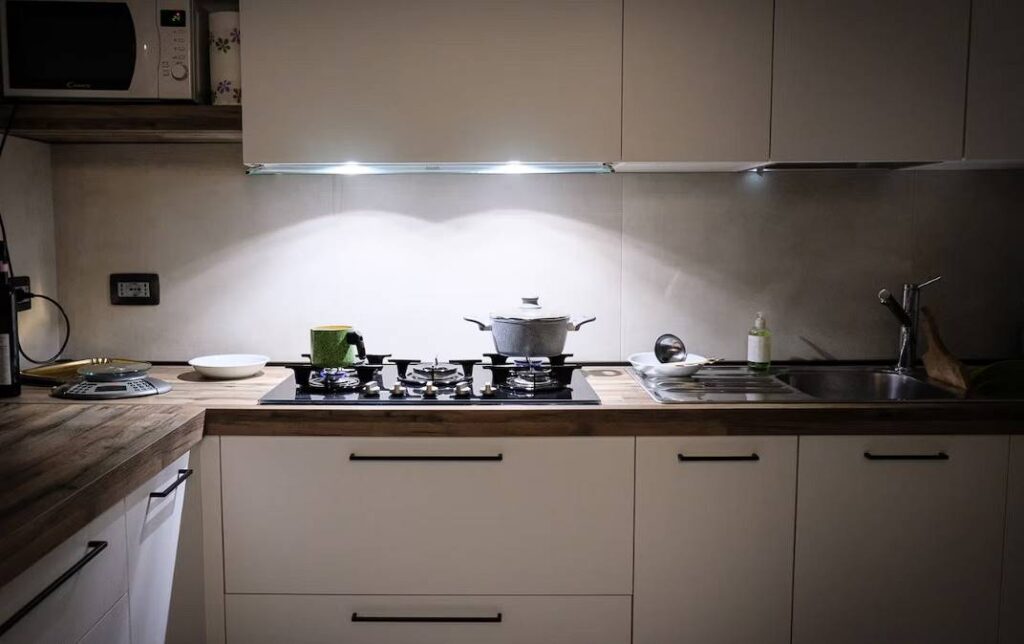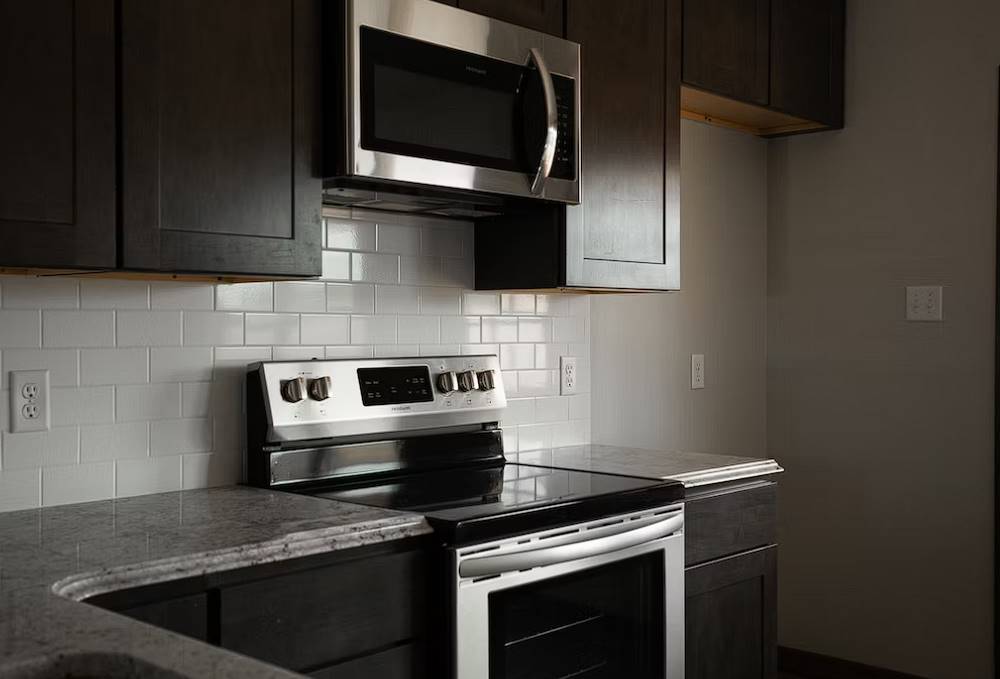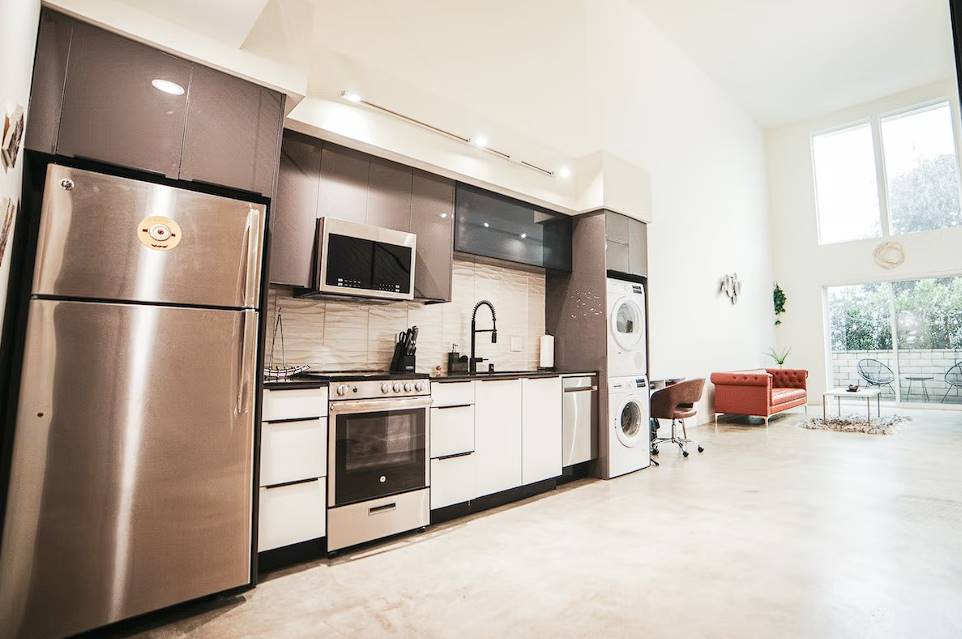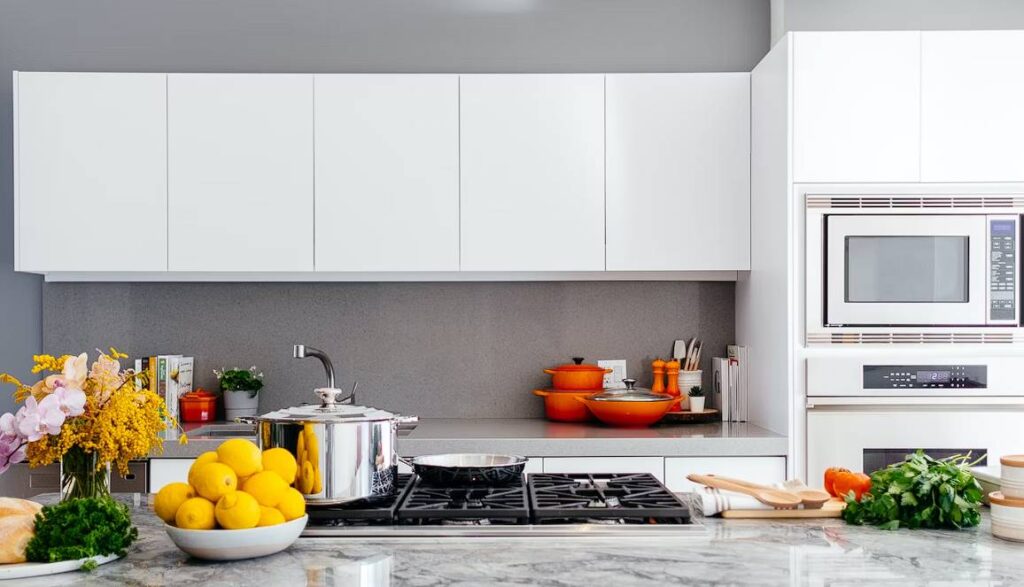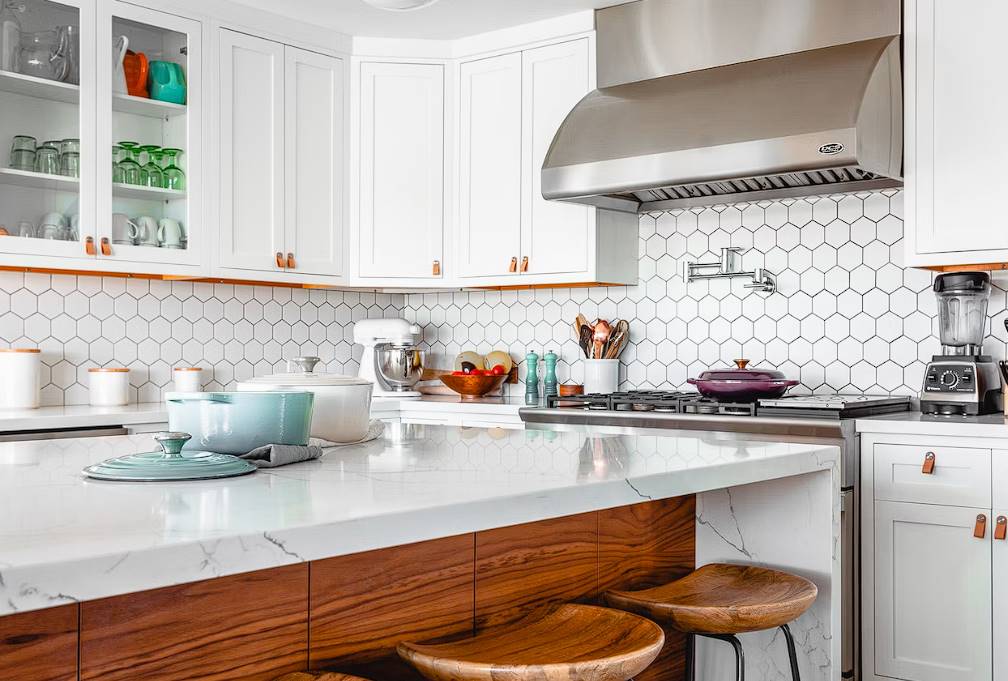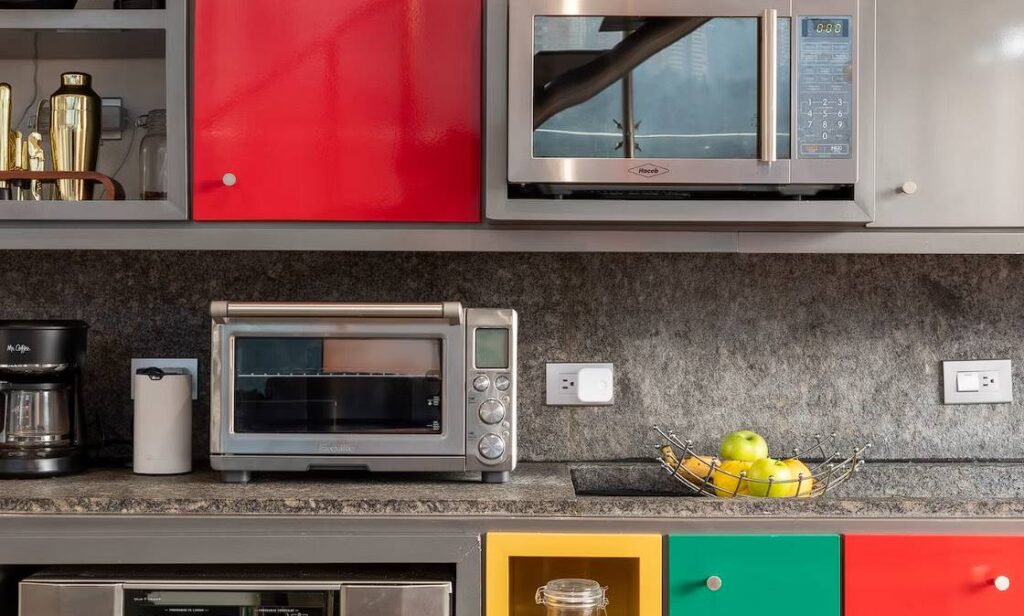Do you need help with cleaning grease off of your kitchen cupboards? Grease splatters on the wooden cabinets in the kitchen are a major source of annoyance. Worse yet is the prospect of making spaghetti.
The backsplash, stove, and cabinets need to be cleaned every day. Use a damp cloth to wipe down the stovetop and backsplash. However, cleaning greasy kitchen cabinets might be a manageable task with these pointers.
You don't need a chemical-laden all-purpose cleaner if you use natural cleaning products around the house. Our all-natural cleaning products can remove grease that has been there for months. Using cleaning supplies that we already have around the house is more cost-effective and less harmful.
What Causes Kitchen Cabinets To Become Greasy?
Many women who work from home have this complaint. Before we get down to squeaking the grease, let's analyse the causes.
When you fry chicken that beats the Colonel's or make a stir fry that will have your mouth watering, you are releasing tiny stray droplets of oil.
They float around happily until they bump into something, at which point they immediately adhere. They can float to the upper cabinets and shelves and land in the lower drawers and cabinets.
This process is known as aerosolization. While you cook, they accumulate, forming a coating that discolours the kitchen cabinets' surface and eventually seeps into the crevices. They also have the potential to have an odour when they get old.
This is the source of much frustration in the kitchens of many women. But don't let that limit your creativity in the kitchen! A wide variety of solutions exist, many of which are quite elementary, and we will discuss them all today.
You'll be even more content if you round out your purchase with some natural kitchen cleaners.
Common Problem: Grease Buildup
Many people need help with grease buildup in their kitchens. Cabinets in the kitchen are especially susceptible to the buildup of splatters, cooking oils, and grease particles floating in the air. This can lead to an unsanitary condition in addition to making your cabinets look dirty and unappealing. The cleanliness of your kitchen may be compromised by the accumulation of grease, which can attract dirt, dust, and even pests. Therefore, removing grease buildup is essential for a clean and healthy kitchen.
All kitchen cabinet materials, including wood, laminate, and metal, are susceptible to grease buildup. It typically occurs near the kitchen's focal points, like the stove and oven. When grease is heated, it can splatter and stick to nearby surfaces. Grease can harden and become sticky if not treated, making cleanup even more hassle.
Grease buildup isn't just an eyesore; it can also make your kitchen cabinets less useful. Grease eventually solidifies into a film of grime that can prevent drawers and doors from closing and opening easily. Because of this, opening and closing them may be a challenge.
Cleaning Techniques For Removing Grease From Kitchen Cabinets
We'd rather use what we have instead of buying an expensive chemical cleaner. Grease can be easily removed with common household items like dish soap, baking soda, vinegar, and more.
Dedicate some time to removing the grease stains from your cabinets. While the results from using our recipes are spectacular, degreasing kitchen cabinets requires some work and will likely take a few hours.
Grease Should Be Removed Using Baking Soda And Lemon Degreaser.
Degreasing products for appliances and storage units are widely available. Lemon is the best kitchen degreaser.
The acid in lemon quickly removes the organic filth while leaving a pleasant citrus aroma behind. Because of its alkaline nature, baking soda can quickly remove sticky substances. This method will take only a short time to wipe down the kitchen cabinets and remove grease.
Put the water, baking soda, and lemon juice in a container and stir to combine. Spray it on the accumulated grease, and then wait a few minutes. Use a dry rag to remove it.
Using A Microfiber Cloth To Clean Grease
Paper towels and dishcloths are less effective than microfiber cloth when removing grease from wood cabinets.
When cleaning with your preferred homemade degreaser, use a microfiber cloth. Gently scrub in circular motions to remove the grease. This method can remove grease from kitchen cabinets with a little practice.
The microfiber cloth needs to be rinsed after each use. It can become useless for cleaning if grease gets trapped inside.
Vinegar And Hot Water To Remove Grease From Kitchen Cabinets
There is a straightforward method for cleaning grease from kitchen cupboards. To clean painted cabinetry, mix equal parts vinegar with hot water. White vinegar, being an acid, can erode the finish off unsealed surfaces, including marble.
After combining the two, heat the damp cloth for 20 seconds in the microwave. Wearing rubber gloves, wash the dirty cabinets with hot water and a fresh cloth. While the vinegar disinfects, the heat should dislodge the grease.
How To Remove Grease With Baking Soda And White Vinegar Degreaser
Cleaning greasy kitchen cabinets can be difficult, and you may need more than just our previous advice. Under the stove and on the hinges of our cabinets are two of the worst places for grease to accumulate. But don't worry because even the most stubborn grease buildup can be scrubbed away with this method.
Mix the ingredients in a bowl and soak a cloth in the solution. To learn the most effective method for cleaning kitchen cabinets, start with a damp but not dripping cloth and work your way to the area with the most stubborn grease. Rub the area with moderate pressure until the stain disappears.
Use more degreaser or a slightly wetter cloth if the stain persists. With that, and sometimes, the sticky gunk should come off and be replaced by a smooth shine. Now that we have this and the other nine tips, we can clean our kitchen cabinets no matter how grimy they get.
How To Use Vegetable Oil And Baking Soda Degreaser To Clean Greasy Kitchen Cabinets
Grease stains that have set in are easily removed by mixing vegetable oil. Grease can be easily removed from kitchen cabinets by combining vegetable oil and baking soda.
Using a toothbrush allows us to regulate the amount of paste used and the intensity we scrub the cupboards. Gently scrub in circular motions to remove all grease. After that, we'll be overjoyed with our shiny new wood cabinets in the kitchen.
Use Flour To Clean The Grease
Flour works wonderfully as a cleaning agent around the house. Instead of using harsh chemicals, we can use flour to scrub the grime and grease off the kitchen cupboards. Flour should be applied to a fresh grease stain.
The flour's ability to soak up liquid is at its best when completely dry. You can wipe it up as soon as the flour has absorbed the grease. Using a dry paper towel is the fastest way to dispose of the grease.
In contrast to Magic Erasers, the flour does not leave any marks on the cabinetry when used. When we scrub too vigorously, parts of the wooden kitchen cabinets can be removed with the help of magic erasers.
Dish Soap And Hot Water For Cleaning Kitchen Cabinets
Grease buildup can be quickly and easily removed with many dishwashing soaps. It's safe to clean the cabinets and other kitchen surfaces with dish soap and hot water, which acts as a natural grease cutter. However, excessive water use can cause damage to your wood as it seeps in during the cleaning process.
A foaming soap solution can be made by mixing liquid soap with warm water in a small basin. Wet the microfiber cloth thoroughly. To remove the grease without damaging the wood, rub the cabinet doors gently. Getting your kitchen cabinet sparkling clean should take at least a few minutes.
Dish soap can be replaced with liquid soap or shampoo in a pinch. This is a great recipe for cleaning cabinets, but if you need to wash dishes, try our homemade dishwasher cleaner instead.
Ammonia And Water Degreaser Cut Through Grease
There are a lot of products for the home that contain ammonia. Soap is produced when ammonia and grease are combined in the right proportions.
Apply the water and ammonia solution to the microfiber cloth and saturate it. Be patient and thorough as you scrub. In a matter of seconds, the grease and ammonia should react to loosen the grease from the cabinet. Once removed, the wood cabinets in your kitchen will shine like new.
Use ammonia with caution. Avoid mixing it with bleach and using excessive amounts. The repercussions could be disastrous.
How To Avoid Grease Stains On Cabinets
Taking precautions beforehand is the most effective line of defence. While it's true that there's no foolproof way to keep grease from ending up on your kitchen cabinets, keeping the following tips in mind will go a long way and, more importantly, make cleaning a breeze.
There are a number of things we can do to stop the oil sprays from damaging our cupboards. You can use whichever one sounds better to you.
1. You need one if you cook a lot and still need to get a range hood. Investing in something to contain grease while cooking will pay dividends in the long run.
There are many other benefits to installing a range hood, such as reducing the risk of grease fires and keeping the kitchen free of unpleasant odours.
2. Keep your range hood's filter clean at all times. Several types of inexpensive natural wool are available, and they all do an excellent job of soaking up the smells and droplets of oil that fly into the air during cooking.
3. Kitchen cabinets, especially those in close proximity to the stove, benefit from a weekly light swipe-up cleaning routine. The accumulation of grease on your cupboards will be avoided in this way.
Remember to check the nooks and crannies of your kitchen cabinets, as grease can accumulate there and cause the doors to seal shut.
4. Oil and fat use can be minimised if one so chooses. There are many suggestions for how to spice up your cooking routine, such as increasing your use of the oven.
You can reduce the amount of oil in a dish by adjusting the cooking times and changing some components.
Your time spent waiting by the stove will be halved, believe us a. But on the other hand, we can't give up oil-frying altogether, and that's a whole other can of worms!
5. If you have a filter fan setup, you should learn how to maintain it. Keep in mind that filters should be replaced on a regular basis. An inefficient filter is a clogged one. It would serve the same purpose as hanging a picture on the wall.
6. When working on the fry, you should protect yourself by using splatter screens or splatter guards. This will result in fewer direct oil projectiles hitting cabinets that are nearby.
7. Preparing for a party that will require a lot of cooking? For a game night, you have to deep-fry a few hundred chicken wings, cook a tonne of French fries, and flip burgers on a stove-top griddle. Wax paper could be used to protect your cabinets from grease.
Conclusion
Grease buildup in kitchen cabinets is a common issue, especially for women working from home. This buildup can cause unsanitary conditions and make the cabinets look dirty and unappealing. To remove grease, use common household items like dish soap, baking soda, vinegar, and more.
Baking soda and lemon degreaser are effective for removing grease from kitchen cabinets. Mix equal parts vinegar and hot water, then heat the damp cloth for 20 seconds in the microwave. Wear rubber gloves and wash the dirty cabinets with hot water and a fresh cloth.
Using vegetable oil and baking soda degreaser can also help remove grease stains. Mix the ingredients in a bowl and soak a cloth in the solution. Rub the area with moderate pressure until the stain disappears. Use more degreaser or a slightly wetter cloth if the stain persists.
Flour is a great cleaning agent around the house, as it can absorb grease and remove grime and grease. Apply the mixture to a fresh grease stain and wipe it up as soon as it absorbs the grease. Using a dry paper towel is the fastest way to dispose of the grease.
In summary, removing grease buildup from kitchen cabinets is a simple and effective solution. By using natural cleaning products and using a combination of vinegar and baking soda, you can maintain the cleanliness and functionality of your kitchen. Magic erasers are used to remove marks on wooden kitchen cabinets, but excessive use can cause damage to the wood. Dish soap and hot water can be used to clean cabinets and other surfaces, but excessive water use can cause damage. A foaming soap solution can be made by mixing liquid soap with warm water and rubbing the cabinet doors gently. Ammonia and water degreaser can also be used to remove grease from cabinets.
To avoid grease stains, take precautions beforehand, such as investing in a range hood, keeping the range hood's filter clean, and having a weekly light swipe-up cleaning routine. Minimize oil and fat use by increasing oven use, adjusting cooking times, and changing cooking components. Regularly replace filter filters and use splatter screens or splatter guards when working on fry dishes. Wax paper can also be used to protect cabinets from grease from cooking parties.
Content Summary:
- Do you need help with cleaning grease off of your kitchen cupboards?
- Grease splatters on the wooden cabinets in the kitchen are a major source of annoyance.
- The backsplash, stove, and cabinets need to be cleaned every day.
- Use a damp cloth to wipe down the stovetop and backsplash.
- However, cleaning greasy kitchen cabinets might be a manageable task with these pointers.
- You don't need a chemical-laden all-purpose cleaner if you use natural cleaning products around the house.
- Our all-natural cleaning products can remove grease that has been there for months.
- Using cleaning supplies that we already have around the house is more cost-effective and less harmful.
- Common Problem: Grease Buildup Many people need help with grease buildup in their kitchens.
- Therefore, removing grease buildup is essential for a clean and healthy kitchen.
- We'd rather use what we have instead of buying an expensive chemical cleaner.
- Grease can be easily removed with common household items like dish soap, baking soda, vinegar, and more.
- Dedicate some time to removing the grease stains from your cabinets.
- Lemon is the best kitchen degreaser.
- When cleaning with your preferred homemade degreaser, use a microfiber cloth.
- Gently scrub in circular motions to remove the grease.
- There is a straightforward method for cleaning grease from kitchen cupboards.
- To clean painted cabinetry, mix equal parts vinegar with hot water.
- Cleaning greasy kitchen cabinets can be difficult, and you may need more than just our previous advice.
- Cabinets Grease stains that have set in are easily removed by mixing vegetable oil.
- Grease can be easily removed from kitchen cabinets by combining vegetable oil and baking soda.
- Flour works wonderfully as a cleaning agent around the house.
- Instead of using harsh chemicals, we can use flour to scrub the grime and grease off the kitchen cupboards.
- Using a dry paper towel is the fastest way to dispose of the grease.
- When we scrub too vigorously, parts of the wooden kitchen cabinets can be removed with the help of magic erasers.
- It's safe to clean the cabinets and other kitchen surfaces with dish soap and hot water, which acts as a natural grease cutter.
- Getting your kitchen cabinet sparkling clean should take at least a few minutes.
- Apply the water and ammonia solution to the microfiber cloth and saturate it.
- Use ammonia with caution.
- Avoid mixing it with bleach and using excessive amounts.
- While it's true that there's no foolproof way to keep grease from ending up on your kitchen cabinets, keeping the following tips in mind will go a long way and, more importantly, make cleaning a breeze.
- There are a number of things we can do to stop the oil sprays from damaging our cupboards.
- You need one if you cook a lot and still need to get a range hood.
- Keep your range hood's filter clean at all times.
- The accumulation of grease on your cupboards will be avoided in this way.
- Remember to check the nooks and crannies of your kitchen cabinets, as grease can accumulate there and cause the doors to seal shut.
- There are many suggestions for how to spice up your cooking routine, such as increasing your use of the oven.
- You can reduce the amount of oil in a dish by adjusting the cooking times and changing some components.
- If you have a filter fan setup, you should learn how to maintain it.
- Preparing for a party that will require a lot of cooking?
- Wax paper could be used to protect your cabinets from grease.
Frequently Asked Questions
It is recommended to clean your kitchen cabinets at least once a month to prevent grease buildup. However, more frequent cleaning may be necessary if you cook frequently or notice significant grease accumulation.
Yes, you can use any mild dish soap to clean grease from your cabinets. Avoid harsh or abrasive cleaners, as they can damage the cabinet finish.
It is only sometimes necessary to remove cabinet hardware when cleaning grease. However, removing and cleaning the hardware separately can provide a more thorough cleaning if the hardware is greasy or dirty.
It is generally not recommended to use bleach to remove grease from cabinets, especially if your cabinets have a finish or are made of wood. Bleach can be harsh and may cause discolouration or damage to the cabinets. Stick to milder cleaning solutions like warm soapy water or vinegar.
For stubborn grease stains on wooden cabinets, try mixing equal parts vinegar and olive oil. Apply the mixture to the stains and let it sit for a few minutes before gently wiping it away with a clean cloth. Remember to test this method on a small, inconspicuous cabinet area first to ensure it doesn't damage the finish.

